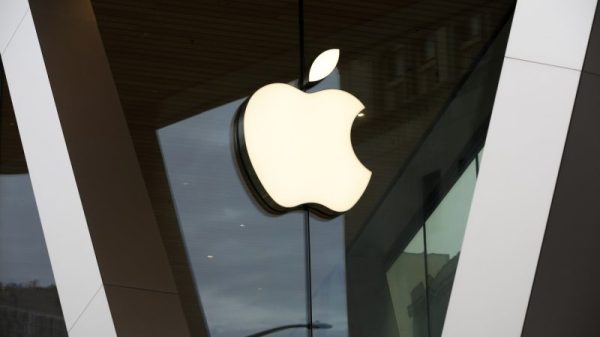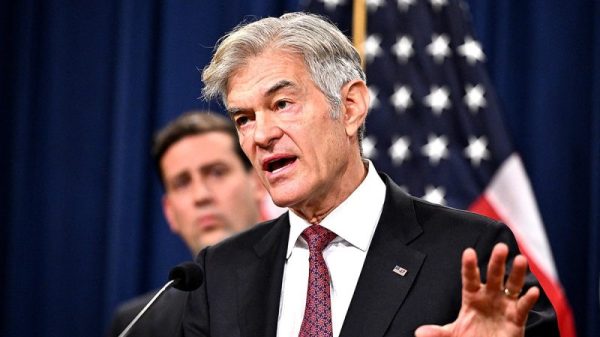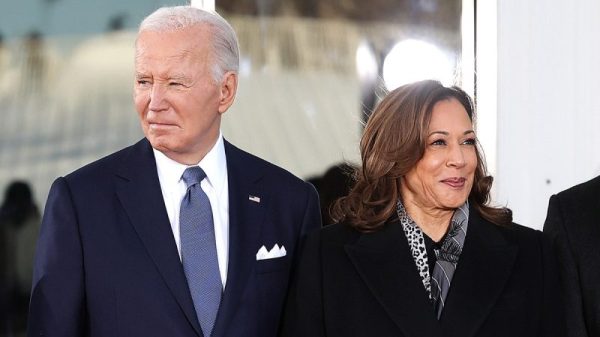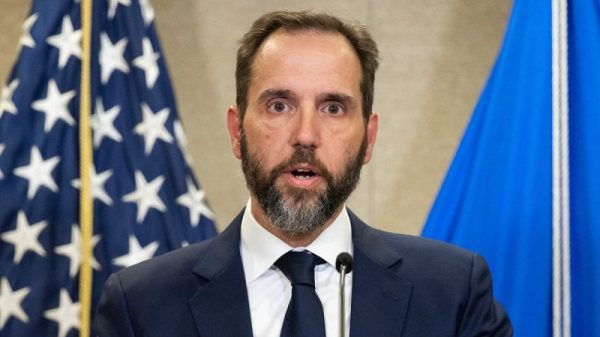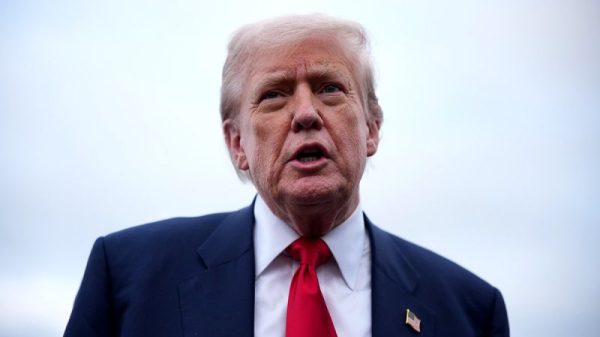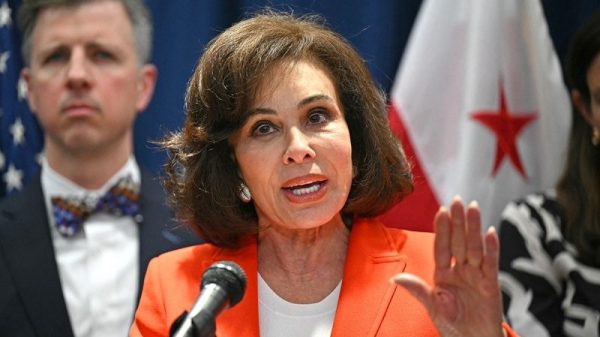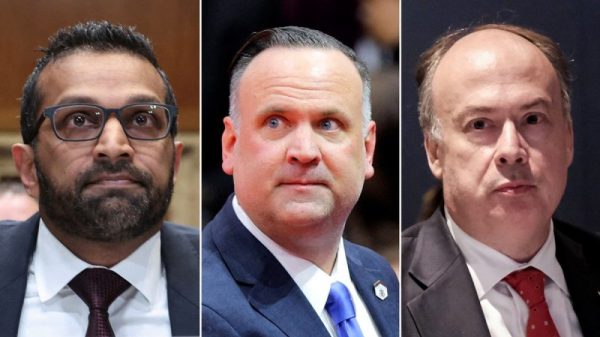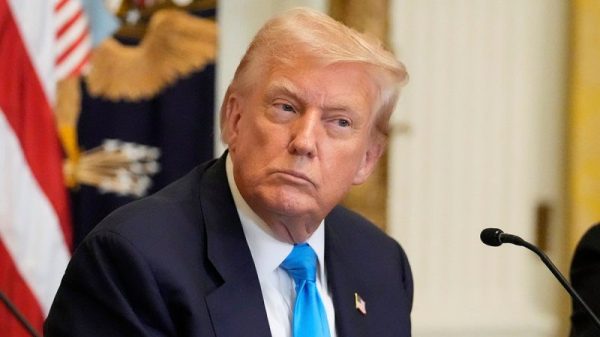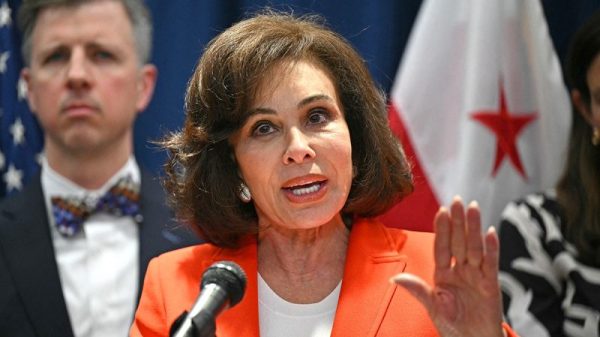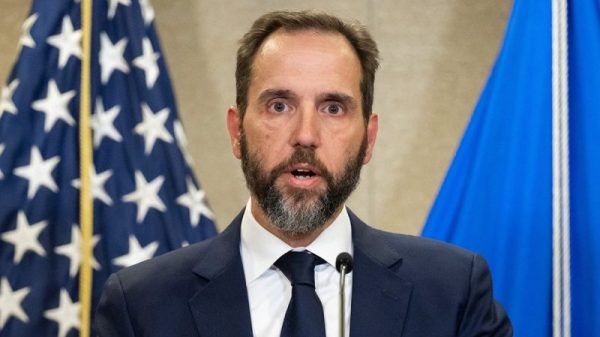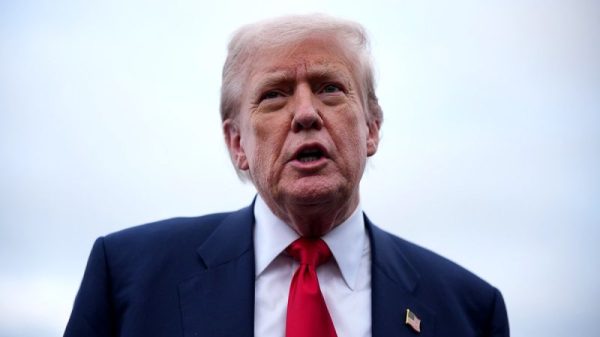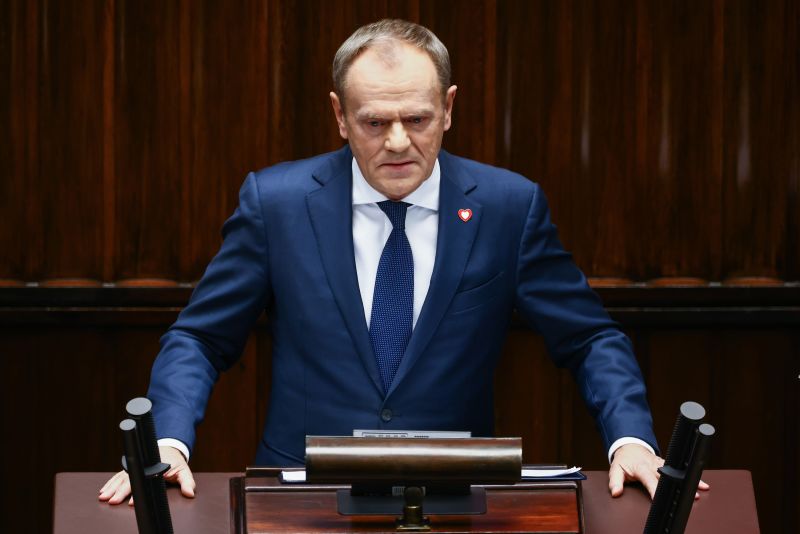When Donald Tusk first won power in Poland in 2007, the country’s media coined a tender moniker to describe his approach towards his political rivals: the “politics of love.”
His second stint as the country’s prime minister is proving far less amorous.
The returning veteran of Polish centrism, who formed a coalition government after an impressive election result last year, has surprised critics and even many supporters with a confrontational approach towards Law and Justice (PiS), the populist group he defeated.
“His attitude (in 2007) was extremely conciliatory towards the defeated enemy. I think he later regretted that,” said Jacek Kucharczyk, the president of the Warsaw-based Institute of Public Affairs think tank.
This time, Tusk has moved “as quickly and decisively as possible” in tackling the gargantuan task of undoing PiS’ illiberal and far-reaching changes to the Polish state – an agenda he and his supporters say will restore Poland’s democratic institutions.
“He wanted to do the most difficult – politically, legally – things first, in order to clean the slate,” Kucharczyk said.
But cleaning the slate is painful business, and Tusk’s early moves as prime minister have caused fissures in Polish society to explode into outright hostility.
The country’s public television channel, TVP, which essentially became a mouthpiece for the previous government, has been ripped off the air. Two senior ex-ministers in PiS governments have been arrested inside the Presidential Palace. And those on the right of Polish politics have taken to the streets in an effort to drum up pressure on the new leader.
It has delighted many of those who voted for Tusk’s alliance of parties, and satisfied a blood lust among much of Poland’s population after eight divisive years of PiS rule. “There’s a sense of justice being seen to be done,” said Stanley Bill, a professor of Polish Studies at the University of Cambridge.
But there are concerns too that Tusk is doing too much, too fast.
“No plan has been presented for how the institutions will be restored in the medium or long term,” Bill argued. “It’s been done in a hurry.”
“We’re in an ad hoc state of exception,” he added. “We’re seeing an escalation of a genuine political and legal crisis in Poland.”
An aggressive first move
The central question facing Tusk is how to restore the independence of Poland’s media and judiciary, which has been degraded by eight years of authoritarian PiS reforms.
It is a question with no right answer. PiS protected its changes to the state by stuffing legal and decision-making bodies with loyalists, and the PiS-aligned President Andrzej Duda is expected to block legislative attempts to undo those reforms.
“(PiS’s) philosophy was to create as much legal ambiguity as possible,” explained Kucharczyk.
But Tusk – a politician with a reputation for pragmatism and restraint – showed his intentions within days of taking office.
He dismissed the heads of public broadcaster TVP, replacing them with new executives, in an effort to rapidly remove the pro-PiS bias that had turned the national broadcaster into a partisan outlet.
That move outraged PiS, causing a weeks-long sit-in protest inside TVP’s headquarters and forcing its news channel off the air over Christmas. A subsequent spat with Duda over funding for the broadcaster ended with the government putting it into liquidation, alongside news agency PAP.
But it fulfilled a promise Tusk made during the election to remove PiS’s influence on the channel “in 24 hours.” And it brought relief to millions of voters – including even some PiS supporters – who had become increasingly embarrassed and tired of the broadcaster’s slant.
“It became symbolic of the excesses of the PiS government,” Bill said of TVP’s transformation into a Hungarian-style state-captured medium. “Even his more moderate voters didn’t want to watch the propaganda on TVP for a day longer.”
“People who support this government considered the status quo in public media as not only a political scandal, but a moral scandal,” Kucharczyk added. “(They) are relieved that the people who ran the media are gone, and they’re thankful that this happened so quickly… many people didn’t think this would be possible.”
There was a personal motive for Tusk, too. “You couldn’t be in the situation that Tusk has been in for eight years – totally demonized, and presented as the root of all evil – and not have it affect you,” Bill said.
“The political and personal motives here are very strongly connected,” added Kucharczyk.
A trade-off between two evils
Tusk fanned the flames of Poland’s societal divide with his early moves on public television – an “egg-breaking” approach to restoring democracy that critics say mirrors the methods of his populist rivals.
His initial move to dismiss the PiS-appointed executives of TVP was ruled unlawful by the PiS-filled Constitutional Tribunal – a body whose authority the government dismisses – and it caused an early first standoff with Duda.
Then, soon after, Polish police dramatically entered the Presidential Palace to arrest on corruption charges two PiS politicians who had seemingly taken refuge in Duda’s place of work. Duda and PiS had maintained they were legally pardoned years ago, a stance the courts disagreed with, and the party has since made the two politicians martyrs of their wounded populist movement. Duda issued a second pardon on Tuesday.
The timing of the saga coincidentally fell in Tusk’s first weeks, and in the wake of the clash over TVP, intensifying the dogfight between Tusk and his predecessors in power.
“Just as the PiS occupation of Poland ended, the PiS occupation of state offices will end,” Tusk wrote on X, formerly known as Twitter, last week, in a comment indicative of his pugnacious attitude towards the party’s leaders. “The occupiers’ reputation will stay with them for a long time.”
His moves have heightened a tense political environment inside Poland, which had been simmering since long before October’s election and increased during a drawn-out transfer of power.
Central to the problem is that PiS built many of its reforms into law, and created a sympathetic legal apparatus to further protect its changes.
The result is that Poles effectively live in two separate realities depending on their political leanings, with each universe containing courts and institutions that question the authority of the other.
“It’s extremely difficult to find any way to undo (PiS reforms), without resorting to the same sorts of decisionist, legally dubious means that PiS used to capture the institutions in the first place” as a result, Bill argued.
To force changes at TVP, for example, Tusk had to bypass the National Media Council – a body that PiS created in 2016 to oversee public media, and promptly filled with loyalists. The agency is widely dismissed as an effort by PiS to cement its influence over public media while creating the semblance of independence in how it is governed; but its creation was nonetheless codified in law, so to dismantle it would require Duda’s sign-off.
But Bill added that Tusk’s dilemma is “a tradeoff between different evils.”
“The alternative would have been to work more slowly, more deliberately, which could take years,” he said. “Taking the more delicate approach (would) mean, in practice, having to leave degenerated, captured institutions as they are for some period of time.”
‘No clear plan for what’s next’
Early signs suggest Poles have not been turned off by Tusk’s politically aggressive first weeks.
Opinion polls indicate his coalition would win another election with a slightly increased vote share. PiS’ share of the vote has meanwhile slumped amid the party’s angry backlash to Tusk’s moves, with less than a third of Poles supporting the group in most surveys.
And his appointment has been celebrated in Brussels. European Commission President Ursula von der Leyen told reporters at a joint news conference with Tusk last month: “I welcome your commitment to put the rule of law at the top of your government’s agenda… we will need to make up for lost time.”
But the road ahead could be difficult to navigate.
“There is no clear plan for what happens next,” Bill said. He pointed to the liquidation of TVP as a short-term measure; currently, Tusk’s re-capturing of public media is being debated in duelling courts, neither of which accepts the authority of the other.
Tusk enjoys universal support across his coalition for his mission to “de-PiSify” Poland. But he must also turn soon to his own agenda – and he will hope that such moves do not become entangled with or complicated by the effects of his fight with the former ruling party.
Tusk recently reiterated a campaign promise to loosen Poland’s abortion rules, which were changed by PiS and currently make the procedure virtually impossible to access. He has been pushed to make progress on that issue by the left-wing party in his alliance, but he will need also to keep more conservative, center-right lawmakers onside.
And on the European stage, Tusk will hope to soon unfreeze funds for Poland that were blocked by the European Union over PiS’ degradation of the rule of law.
It is a hefty in-tray, and his every move will continue to be criticized by the opposition, who remain a formidable force even without the control of the national broadcaster.
“One of the unifying forces of PiS supporters is distrust, or even hatred, of Donald Tusk,” Kucharczyk said. “That hasn’t changed.”
The politics of love feel like a relic from a different world. And Tusk’s gameplan makes clear that things will get messier before they get better.
Nonetheless, after eight years of populist rule that hardened the battle lines of Polish politics, much of the public is spoiling for a fight.
Tusk’s approach “can only further damage Poland’s institutions, legal order, and perhaps most importantly the set of conventions in which those institutions are practiced,” Bill said. “(But) from a political point of view, it’s simple: this is what the voters want.”







